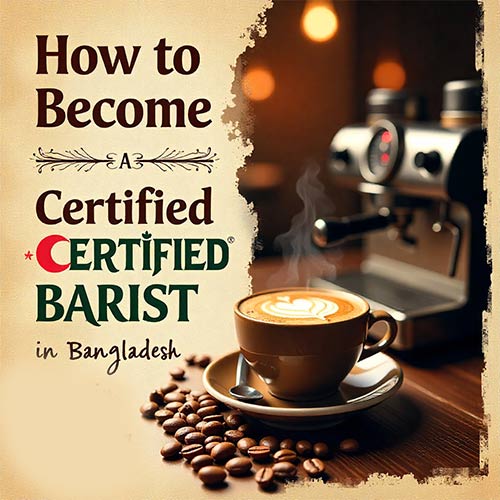How to Become a Certified Barista in Bangladesh
Learn how to become a certified Barista in Bangladesh with top-quality training, international certification, and career support. Bangladesh’s coffee culture is booming. Moreover, as specialty cafés sprout across Dhaka and other cities, the demand for skilled baristas is growing fast. Industry analysts project the Bangladeshi coffee market to reach over $360 million by 2024. However, many café owners note a shortage of trained baristas. For students, career-changers, or coffee enthusiasts, this is great news: it means job opportunities for those with proper training. The key is to get certified at a top academy. Global Barista Training Academy (GBTA) in Dhaka stands out as the premier choice. GBTA combines ISO-certified quality standards with expert instructors and a career-focused curriculum. This step-by-step guide will show you how to turn your passion for coffee into a certified skill set with GBTA.
Step 1: Explore Your Coffee Passion and Industry Potential
Bangladesh’s Growing Café Culture
Before enrolling, take a moment to confirm your interest. Do you love crafting coffee drinks or dream of working in a buzzing café? Think about who you are: a college student, a professional eyeing a career switch, or simply a coffee enthusiast. The good news is that the Bangladesh café scene offers exciting prospects. For example, dozens of trendy coffee shops now serve Dhaka’s urban crowd, and that number is rising. This expansion fuels demand for trained Barista in Bangladesh. One business report notes that “hundreds of young people in Bangladesh are now taking barista training courses to find both part-time and full-time employment” – even abroad. With coffee culture on the rise (especially among the 18–40 age group), skilled baristas are in demand. By pursuing this path at GBTA, you tap into a growing industry and improve your career options.
Step 2: Choose GBTA’s ISO-Certified Training Program
Why ISO Certification Matters in Barista Training
When it comes to barista training, not all institutions offer the same level of quality. That’s where the Global Barista Training Academy (GBTA) stands out. In fact, GBTA is proudly ISO 9001:2015 certified, which means its training programs meet internationally recognized standards for quality and consistency. This certification reflects a commitment to structured teaching, student satisfaction, and continuous improvement — all crucial in a hands-on industry like coffee.
At GBTA, you’ll find a career-oriented curriculum that blends theory with practical skills. You’ll learn everything from coffee origins and bean science to espresso extraction, milk texturing, and latte art. Additionally, GBTA also emphasizes soft skills like hygiene, communication, and customer service — essential in any café or hospitality job.
Training is hands-on, using professional-grade espresso machines, grinders, and brewing tools. Classes are kept small to ensure personal attention from experienced, internationally trained instructors. Whether your goal is to work in a top café, go abroad, or start your own business, GBTA prepares you for the real world. It’s not just a course — it’s a solid foundation for a professional barista career.
Step 3: Enroll and Dive into GBTA’s Barista Curriculum
Once you’ve decided, enrolling is straightforward. Contact GBTA (online or by phone) to register for the next batch. GBTA typically runs courses at different levels (basic, intermediate, professional), so you can choose according to your experience. Even if you’re starting fresh, the programs assume no prior barista knowledge.
As you begin classes, expect an immersive curriculum:
Coffee Theory: Learn about coffee varieties, origins, and roasting profiles. Understand the chemistry of extraction – how grind size, temperature, and time affect flavor. GBTA covers brewing science from start to finish, so you grasp why good coffee tastes the way it does.
Espresso & Machines: Get hands-on with professional espresso machines and grinders. You’ll practice pulling shots, calibrating equipment, and maintaining gear. GBTA trains you on industry-standard machines, just like those in high-end cafes.
Milk & Latte Art: Master the skills of steaming milk to the perfect texture. Under instructor guidance, practice pouring lattes, cappuccinos, and other milk-based drinks, creating clean foam and latte art designs.
Customer Service: Participate in role-play exercises to hone your communication. You’ll learn café etiquette, how to interact with customers, and tips on teamwork in a busy cafe environment.
Cafe Management Basics: GBTA even offers a glimpse into running a coffee business. Topics can include menu planning, cost control, and quality control standards.
Throughout the course, lessons are theory paired with practice. Every new concept is demonstrated by the trainer, and then you immediately practice it hands-on. GBTA’s facility is set up like a real café lab, so learning feels authentic. Keep up with the coursework, and you’ll build confidence quickly.
Step 4: Learn from Expert Trainers
An advantage of GBTA is its instructors. All GBTA trainers are industry experts – former baristas and coffee professionals who have mastered their craft. Many are SCA-certified, meaning they meet international benchmarks for barista instruction. In class, they share not only recipes but also insider tips from years on the job.
Expect personalized coaching. Therefore, GBTA keeps batch sizes small so trainers can give one-on-one feedback. If your espresso shot is under-extracted or your latte art is shaky, the trainer will help you adjust. This mentorship accelerates learning. They also encourage questions; for example, you might learn the finer points of grind settings or the science behind a perfect crema.
Because the emphasis is hands-on, you’ll spend most of your time at the machine or brewing station. Trainers monitor each student carefully. By repeatedly trying drinks under supervision, you quickly develop muscle memory and technique. Many students find that by the end of the course, they can brew consistently high-quality coffee drinks.
Step 5: Make the Most of GBTA’s Facilities and Support
GBTA aims to support students beyond the classroom. The academy is located in a modern training facility, with fully equipped labs mimicking real café setups. This means your practice sessions feel like working in an actual coffee shop. You’ll use real barista tools, comfortable workstations, and even learn how to maintain a tidy service area.
For those coming from outside Dhaka, GBTA arranges hospitality assistance. While the academy itself does not have dormitories, it partners with nearby hostels and hotels to provide affordable lodging recommendations. You’ll also enjoy on-campus comforts during training days, such as a student lounge or cafeteria serving light refreshments. This supportive environment lets you focus entirely on learning.
Networking is another perk. In class, you’ll meet fellow coffee enthusiasts. Studying together and exchanging tips helps everyone improve. GBTA sometimes invites guest speakers from top cafes or holds campus barista competitions. These events enrich your training and help build industry connections.
Overall, GBTA’s facilities and student services are designed to make your training convenient and immersive. With the academy taking care of logistics, you can concentrate on mastering barista skills.
Step 6: Get Certified & Celebrate
After the training period (often 1–2 weeks for basic courses, longer for advanced levels), it’s time to get certified. GBTA will assess your skills through a practical exam and possibly a short written test. You might be asked to prepare specific drinks (espresso, latte, pour-over) under exam conditions and demonstrate your knowledge of coffee theory.
Passing this assessment earns you a barista certification from GBTA. As a result, thanks to the ISO certification and professional curriculum, this credential is recognized by cafe employers. It proves you’re trained to international standards. GBTA issues you a certificate stating you have completed the course; you’ll also get an ID card showing your barista qualification.
This certification opens doors. You can confidently apply for barista positions at coffee chains, boutique cafes, hotels, or restaurants. Many GBTA graduates have found jobs quickly. In fact, media reports highlight that trained baristas from Bangladesh often land part-time or full-time jobs even abroad. With your GBTA certificate, your résumé shows you have the right skills. Employers see you’ve undergone hands-on, quality training – a big plus in a competitive market.
Step 7: Launch and Grow Your Barista Career
Local Opportunities for Barista in Bangladesh
With your certification in hand, the possibilities are wide open. For instance, you can start by joining a local coffee shop or hotel cafe, where employers value formally trained staff. Thanks to GBTA’s industry network, you may get introductions to hiring partners. If you’re entrepreneurial, you could even consider starting a small coffee cart or cafe, using the entrepreneurial and management insights you gained at Global Barista Training Academy (GBTA).
International Career Options
Remember the global market: Barista in Bangladesh are in demand overseas as well. A US university student profiled in The Business Standard did a one-week barista course in Dhaka before studying in Australia, specifically to help her land a campus café job. Others have gone on to work in coffee shops across the Middle East or Europe after GBTA-style training.
Keep Improving Your Coffee Skills
Keep practicing your craft. Many GBTA alumni continue to hone skills like latte art or learn about coffee brewing methods on their own or through advanced courses. The coffee industry encourages continuous learning. By staying curious and perhaps taking advanced workshops at GBTA or elsewhere, you’ll keep your skills sharp and advance in your career.
Becoming a certified Barista in Bangladesh with GBTA sets you up for a rewarding path. Not only do you gain a respected qualification, but you also join a community of coffee professionals. Whether you brew coffee for local customers, manage a café, or even end up teaching others, your GBTA training is a strong foundation.
In summary, here’s how to become a certified barista in Bangladesh with GBTA:
- Confirm Your Passion: Recognize the booming café culture in Bangladesh and your interest in coffee.
- Choose GBTA: Enroll in GBTA’s ISO-certified program to ensure top-quality training.
- Dive into Training: Immerse yourself in GBTA’s professional curriculum, from coffee basics to advanced brewing techniques.
- Learn Hands-On: Practice daily with expert trainers guiding you every step.
- Use the Facilities: Take advantage of GBTA’s fully equipped labs and student support services.
- Get Certified: Pass the assessment to earn your barista certificate.
- Build Your Career: Leverage your new skills and GBTA’s reputation to find barista jobs or start your own coffee venture.
By following these steps at Global Barista Training Academy (GBTA). Indeed, you’ll be well on your way to joining the ranks of skilled Barista in Bangladesh, equipped to brew excellent coffee and serve customers with professionalism. Your coffee journey starts here – success is brewing!



